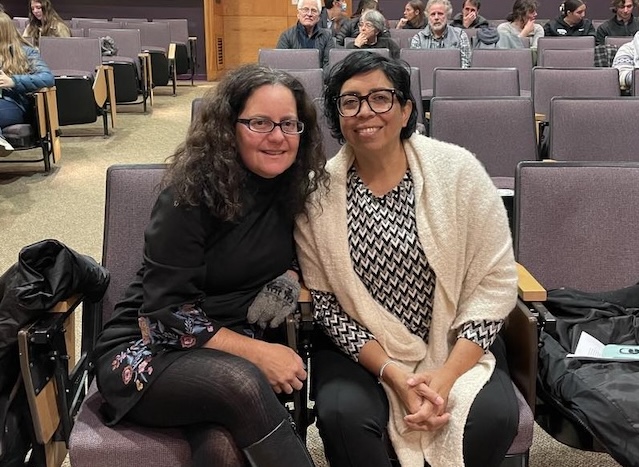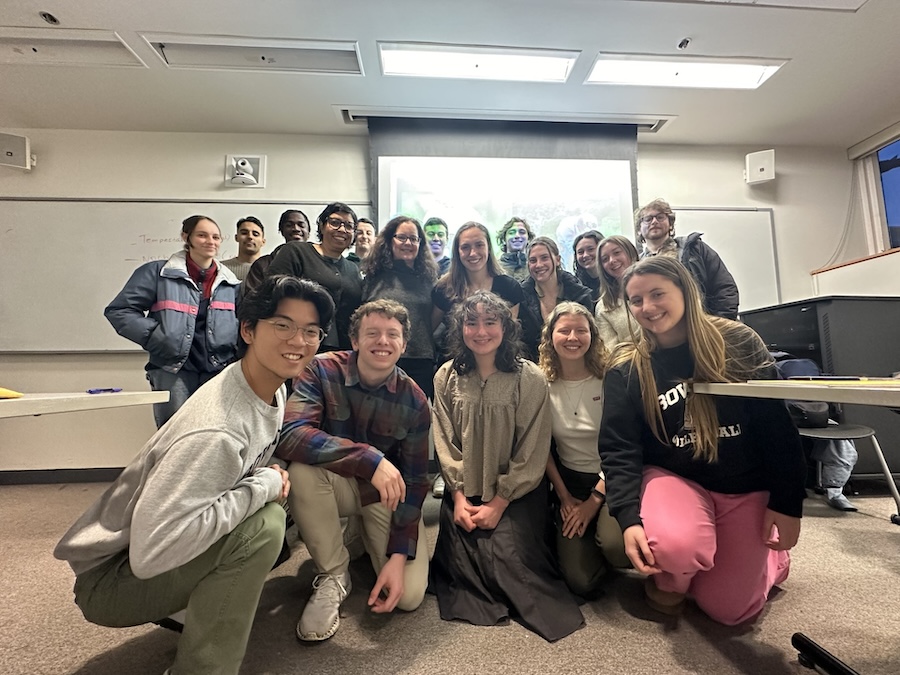Award-winning El Salvadoran-Mexican Filmmaker Visits Bowdoin
By Anna Diaconu ’24 and Katie Draeger ’24
Tempestad, which is based on a true story, follows the parallel journeys of two women—Miryam and Adela—who have both been impacted by human trafficking in personal ways. Miryam was trafficked and placed in a cartel-run prison for five years. Adela lost her university-aged daughter to trafficking.
Huezo centers their painful experiences by making the women the narrators of the film. They share stories of detainment, their search for missing family (“los desaparecidos,” a term that refers to people stolen by traffickers and kidnappers), and the ways they rebuild their strength through humor and connection to others. In fact, scenes of laughter between women appear throughout the film. In this way, the movie highlights the persistence of hope while remaining respectful of the women’s despair.
Huezo deals intimately with stories that are often untold, especially in American classrooms. However, despite the complex nature of the issues surrounding los desaparecidos, her film is accessible, even to American audiences.
Tempestad dances along the line between documentary and feature film. Although it relates a true story, the project’s cinematography, soundscape, and storytelling are highly artistic.
During the Q&A at Bowdoin, Huezo recounted several unique characteristics of her film. She collaborated with meteorologists who helped her capture sounds from storms and torrential rain. She used windows and glass to create a sensation of distance between the protagonist and the audience. And she described her intentional fracturing of the auditory and visual storylines to mimic the effect of trauma on the human brain.

Huezo also revealed why she refrained from showing the face of one of the protagonists. Her decision to hide Miryam’s face goes beyond the practical choice to protect the woman's identity (although the protection of informants was a topic that was broached in the Q&A). Rather, she concealed Miryam’s appearance to convey the universality of her story—her tragedy could happen to anyone in Mexico. Huezo said she enjoys pushing her audiences to use their imaginations, and appreciates when stories challenge audiences to critically engage with the material.
Huezo also produced another film for Netflix, Prayers for the Stolen, which won multiple awards, including from the San Sebastían International Film Festival and a special mention from the Cannes Film Festival. Unlike Tempestad, Prayers for the Stolen is a work of fiction that portrays the coming-of-age stories of three girls in the Jalisco region of Mexico. Throughout their adolescence, the cartel disappears girls from their town, which lurks as a constant background threat as they study, forge friendships, experience first love, and care for their families.
On November 29, Huezo visited Wolfenzon’s class Ghosts in Mexican Literature to discuss Tempestad and Prayers for the Stolen. As Huezo answered questions from students, she discussed the joys of working with young actors, her anxieties and personal safety concerns related to filming, and her artistic process.
Throughout the semester, students in Ghosts in Mexican Literature read and studied some of the works that Wolfenzon analyzed in her book, New Ghosts in Mexican Literature, including Pedro Páramo (Juan Rulfo), Aura (Carlos Fuentes), El huésped (Guadalupe Nettel), Señales que precederán al fin del mundo (Yuri Herrera)—and other books related to the topic such as La Compañía (Verónica Gerber Bicecci), 68 (Paco Ignacio Taibo), and Tierra de nadie (Eduardo Antonio Parra).
"All of these books are connected with the idea of the fantasmagoría in different realms, such as how unofficial history can become a ghost; how the influence of modernist Mexican writers is not well known or considered; how Mayan ideas of the inframundo are connected with immigration and how immigrants are, in a way, one of the new ghosts in America; or how machines are doing human work and we are living in a post-human world," Wolfenzon said.
Wolfenzon invited Huezo to Bowdoin because she said her films "are in dialogue with these topics. She shows the absence of things or persons through images."
"In other words, it is so difficult to show through the art of cinema what is not there (since cinema is done through images), that I found her movies could bring another perspective, a different realm of subjectivity, and a unique way to tell stories connected with ghosts," she added.
Huezo is a highly acclaimed director who has won several Ariel Awards for best Documentary Feature and Documentary Short, as well as a special mention at the Cannes Film Festival and the Horizontes Latinos Award at the San Sebastian International Film Festival, among many others. She is the director of the films Tiempo cáustico, El ombligo del mundo, El lugar más pequeño, Ausencias, and The Echo.



